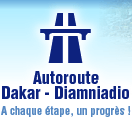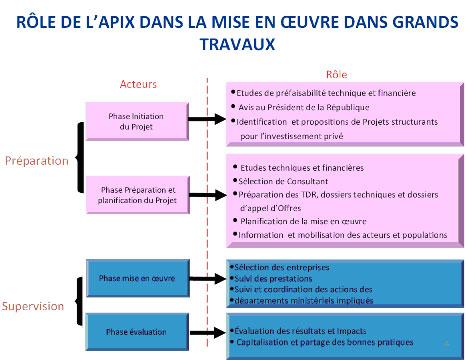Project set-up
To successfully carry through this project and take all its aspects into account, there was need to set up an appropriate legal and institutional framework that registers a break with past practices so as to fit into the new process of the dawning millennium.
Â
Institutional Framework
In order to create the conditions conducive to the competitiveness of all sectors of the economy by developing economic infrastructure in support of production, and implementing measures for the promotion and facilitation of private investments, the President of the Republic created APIX s.a. mandated to assist in the design and implementation of his policy in the fields of Investment Promotion and Major Projects.
 APIX s.a. is thus entrusted with supervizing the implementation of strategies and programmes meant to boost private investment as well as the realization of economic infrastructure and major projects.
The accomplishment of each of these major projects calls for a participatory approach involving all the categories of actors concerned, notably the Ministry of Town and Land-Use Planning and the Interior Ministry.
For this reason, a Committee in charge of Steering Major Projects was set up and mandated to ensure the coordination and technical monitoring of the actions undertaken by the various ministries concerned by the implementation of the infrastructure projects, the implementation of which APIX sa. intends to supervize directly, as requested by the Head of State. This Steering Committee is chaired by the Director General of APIX s.a. who presents a quarterly report on the state of progress of the Major Projects. Â
Every quarter, the President of the Republic himself presides over a Presidential Council while the Prime Minister chairs an Inter-ministerial Council every month. Both meetings deal monitor the state of progress of the Major Projects. Â
An ad-hoc committee in charge of supervizing operations undertaken to evacuate the rights- of-way for the realization of the Major Projects, chaired by the Interior Minister, was instituted by a Prime Minister’s Order. For each operation for the construction of an infrastructure, the committee’s role consists in delimiting and marking its limits by laying markers, making a list of occupants, evaluating the damages, displacing occupants and pulling down buildings found on the site, in accordance with the regulations in force in Senegal.
The Operational Group, chaired by Governor of the concerned Region, is entrusted by the Committee to discharge the defined tasks, with the support of APIX s.a. services. These actions are also underpinned by a Communication Plan to inform and sensitize the populations directly concerned by the operation and the Senegalese public opinion as a whole.
Â
Legal framework
   BOT Law
The new law n° 2004-13 of 1st March 2004 defines the legal framework for the establishment of Public/Private Partnership in conditions that are both econnomically efficient and transparent. They serve to bridge a gap at a time when Senegal decided to embark on the partnership option to execute and operate major infrastructure projects of public interest.
This laws applies to all « build-operate-transfer » (BOT) contracts, concluded between a public authority and a private operator for the design, financing, accomplishment and operation of an infrastructure of public interest, since the private operator’s remuneration essentially emanates from the charges paid by users. The provisions were formulated in such a way as to ensure that these contracts are concluded with the greatest transparency, in order to allow potential candidates to compete and to obtain the best possible commitment by private partners.
   Law establishing the Infrastructure Council
In addition to the adoption of a law on the build-operate-transfer of infrastructure, the institution of an Infrastructure Council is the second element of the new mechanism set up to promote the execution of infrastructure projects with private funding. Â
The Infrastructure Council has competence to select the project’s operator, on the one hand, and to maintain the balances that condition the continuity of contractual relations, on the other.
There is need to ensure the greatest possible transparency in the selection of the project’s operator. Such an operations is governed by competitive procedures instituted by the BOT law. Besides, the BOT contracts which fit into a long-term process and intervene in
Â
sectors that are subjected to frequent technological adjustments, expose the contracting parties to serious legal risks. The uncertainties of the future generally have a direct impact on the financial costs of infrastructure projects as well as on their feasibility.
Establishing this institution will contribute to reinforcing the projects’ continuity by providing the investor who takes the operating risks and users of the infrastructural services with the guarantee that the State’s policies as well as the decisions of the administration- both contracting party and regulatory authority- will be submitted to an independent review, the results of which will be periodically published. Â
Â












